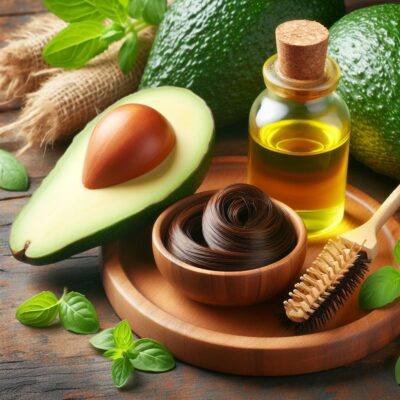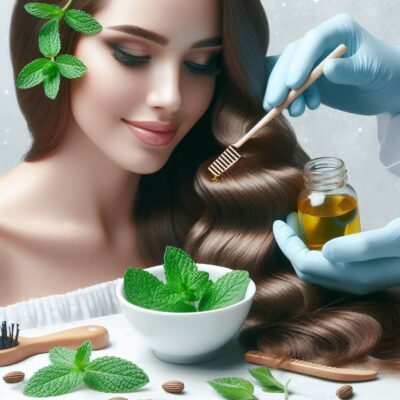
In the pursuit of healthy and luscious hair, many turn to natural remedies to stimulate growth and enhance overall hair health. Avocado oil and peppermint oil are two such natural ingredients that have gained popularity for their purported benefits in promoting hair growth.
Understanding Avocado Oil And Peppermint Oil For Hair Growth. From nourishing the scalp to improving circulation, these oils are believed to offer a range of advantages for those seeking to enhance their hair’s appearance and vitality. In this article, we’ll explore the potential benefits of using avocado oil and peppermint oil for hair growth, examining their properties, applications, and effectiveness.
By understanding the role of these natural oils, individuals can make informed choices about incorporating them into their hair care routines to achieve desired results.
Avocado Oil And Peppermint Oil For Hair Growth

Avocado oil and peppermint oil have garnered attention for their potential to promote hair growth and improve overall hair health. Here’s how each oil may contribute to this goal:
Avocado Oil:
1. Rich in Nutrients:
Avocado oil is packed with essential fatty acids, vitamins, and antioxidants that nourish the scalp and hair follicles, promoting healthy hair growth.
2. Moisturizing Properties:
Its emollient properties help moisturize and hydrate the scalp, preventing dryness and flakiness that can impede hair growth.
3. Stimulates Circulation:
Avocado oil contains oleic acid, which may improve blood circulation when applied to the scalp, enhancing nutrient delivery to the hair follicles and promoting growth.
Peppermint Oil:
1. Cooling Sensation:
Peppermint oil provides a cooling sensation when applied to the scalp, which can help soothe irritation and inflammation, promoting a healthier scalp environment for hair growth.
2. Enhances Blood Flow:
The menthol in peppermint oil has vasodilation properties, meaning it can widen blood vessels and improve blood flow to the scalp, potentially increasing nutrient delivery to the hair follicles.
3. Antimicrobial Properties:
Peppermint oil exhibits antimicrobial properties that may help combat scalp conditions like dandruff and fungal infections, which can hinder hair growth.
While avocado oil and peppermint oil show promise for promoting hair growth, it’s essential to use them correctly and consistently to achieve desired results. Incorporating these oils into regular hair care routines, such as massaging them into the scalp or adding them to hair masks or shampoos, may help maximize their benefits. I hope now you’re fully aware of Avocado Oil And Peppermint Oil For Hair Growth.
Understanding Avocado Oil

In recent years, avocado oil has gained popularity for its versatility and numerous health benefits. Extracted from the pulp of ripe avocados, this rich and flavorful oil is prized for its nutritional content and culinary uses.
Beyond its role in the kitchen, avocado oil has also found its way into the realm of skincare and hair care, thanks to its moisturizing and nourishing properties. Understanding the composition, benefits, and applications of avocado oil is essential for anyone looking to harness its potential for overall well-being.
In this article, we’ll delve into the intricacies of avocado oil, exploring its origins, nutritional profile, health benefits, and practical uses. By gaining insight into avocado oil, individuals can make informed choices about incorporating this versatile oil into their daily routines for improved health and vitality.
Understanding:
Avocado oil is a nutrient-rich oil extracted from the flesh of ripe avocados. Here’s a closer look at its composition, benefits, and uses:
Nutritional Profile:
1. Healthy Fats:
Avocado oil is predominantly composed of healthy monounsaturated fats, particularly oleic acid, which is known for its heart-healthy properties.
2. Vitamins and Minerals:
It also contains various vitamins and minerals, including vitamin E, potassium, and antioxidants, which contribute to its overall nutritional value.
3. Low in Saturated Fat:
Unlike some other cooking oils, avocado oil is low in saturated fat, making it a healthier option for cooking and frying.
Health Benefits:
1. Heart Health:
The monounsaturated fats in avocado oil may help lower LDL (bad) cholesterol levels and reduce the risk of heart disease.
2. Skin Health:
Avocado oil is a popular ingredient in skincare products due to its moisturizing and nourishing properties. It can help hydrate and soothe dry, irritated skin and may even promote wound healing.
3. Hair Health:
When applied to the hair and scalp, avocado oil can help moisturize and condition the hair, reducing frizz and promoting shine.
Practical Uses:
1. Cooking:
Avocado oil has a high smoke point, making it suitable for various cooking methods, including sautéing, frying, and baking. Its mild flavor and nutritional benefits make it a popular choice for culinary enthusiasts.
2. Skincare:
Avocado oil is often used in skincare products such as moisturizers, serums, and creams. It can also be applied directly to the skin as a natural moisturizer or massage oil.
3. Haircare:
In hair care, avocado oil is prized for its ability to moisturize and nourish the hair and scalp. It can be used as a hair mask, conditioner, or styling agent to promote healthy hair growth and shine.
Overall, avocado oil is a versatile and nutritious oil with a wide range of benefits for both culinary and personal care applications. Whether used in the kitchen or as part of a skincare or hair care routine, avocado oil offers a natural and effective way to support health and well-being.
Does Avocado Oil Promote Hair Growth?

In the quest for healthy and vibrant hair, individuals often explore various remedies and products to stimulate growth and enhance hair quality. Avocado oil has emerged as a popular choice among natural hair care enthusiasts due to its purported benefits for hair health.
Rich in vitamins, minerals, and healthy fats, avocado oil is believed to nourish the scalp, strengthen hair follicles, and promote overall hair growth. Understanding the potential of avocado oil in promoting hair growth is essential for those seeking natural solutions for their hair care needs.
Let’s delve into the question of whether avocado oil promotes hair growth, examining its properties, mechanisms of action, and evidence supporting its use in hair care regimens. By gaining insight into the efficacy of avocado oil, individuals can make informed decisions about incorporating it into their hair care routines for optimal results.
Guide On Avocado Oil Promote Hair Growth:
The potential for avocado oil to promote hair growth stems from its nutrient-rich composition and various beneficial properties. Here’s how avocado oil may contribute to improved hair health and growth:
*Nourishes the Scalp:*
Avocado oil is rich in vitamins E and D, which are essential for maintaining a healthy scalp. These vitamins help nourish and moisturize the scalp, reducing dryness and flakiness that can inhibit hair growth.
*Strengthens Hair Follicles:*
The monounsaturated fats in avocado oil, particularly oleic acid, penetrate the hair shaft and strengthen hair follicles from within. This can help reduce breakage and hair loss, promoting thicker and more resilient hair over time.
*Stimulates Circulation:*
Massaging avocado oil into the scalp can help improve blood circulation, delivering essential nutrients and oxygen to the hair follicles. This increased blood flow may stimulate hair growth and contribute to healthier hair overall.
*Moisturizes and Conditions:*
Avocado oil’s emollient properties help moisturize and condition the hair, reducing frizz and enhancing shine. By keeping the hair shaft hydrated and supple, avocado oil may prevent damage and breakage, allowing hair to grow longer and stronger.
*Protects Against Environmental Damage:*
The antioxidants in avocado oil help protect hair from environmental damage caused by sun exposure, pollution, and other external factors. By shielding the hair from oxidative stress, avocado oil may support healthy hair growth and prevent premature aging.
While anecdotal evidence and some studies suggest that avocado oil can promote hair growth and improve hair health, more research is needed to fully understand its mechanisms of action and efficacy.
Nonetheless, incorporating avocado oil into a regular hair care routine as a scalp treatment, conditioner, or styling agent may offer benefits for those seeking natural solutions for their hair concerns.
As with any hair care product, individual results may vary, and it’s essential to monitor the hair’s response and adjust usage accordingly for optimal results.
Benefits Of Avocado Oil For Hair Growth

In the pursuit of healthy, luscious locks, individuals often seek natural remedies to nourish and strengthen their hair. Avocado oil has emerged as a popular choice among beauty enthusiasts for its purported benefits in promoting hair growth and overall hair health.
Extracted from the fruit of the avocado tree, this nutrient-rich oil is packed with vitamins, minerals, and healthy fats that are believed to nourish the scalp, strengthen hair follicles, and stimulate hair growth.
Understanding the potential benefits of avocado oil for hair growth is essential for those looking to enhance their hair care regimen with natural ingredients. In this article, we’ll explore the various advantages that avocado oil may offer for promoting hair growth, examining its properties, applications, and effectiveness in improving hair health.
Benefits:
Avocado oil is prized for its rich nutritional profile and nourishing properties, which may contribute to improved hair growth and overall hair health. Here are some of the key benefits of avocado oil for promoting hair growth:
1. Safe and Natural:
Unlike some commercial hair care products that contain harsh chemicals and additives, avocado oil is a natural and safe alternative for promoting hair growth. It is gentle on the scalp and hair, making it suitable for all hair types, including sensitive or damaged hair.
2. Strengthens Hair Follicles:
The monounsaturated fats in avocado oil, particularly oleic acid, penetrate the hair shaft and strengthen hair follicles from within. This can help prevent breakage and hair loss, promoting thicker and more resilient hair over time.
3. Stimulates Circulation:
Massaging avocado oil into the scalp can help improve blood circulation, delivering essential nutrients and oxygen to the hair follicles. This increased blood flow may stimulate hair growth and contribute to healthier hair overall.
4. Reduces Dandruff and Scalp Irritation:
Avocado oil has anti-inflammatory properties that can help soothe and calm an irritated scalp. It may also help reduce dandruff, itching, and flakiness, promoting a healthier scalp environment for hair growth.
5. Moisturizes and Conditions:
Avocado oil’s emollient properties help moisturize and condition the hair, reducing frizz and enhancing shine. By keeping the hair shaft hydrated and supple, avocado oil may prevent damage and breakage, allowing hair to grow longer and stronger.
6. Protects Against Environmental Damage:
The antioxidants in avocado oil help protect hair from environmental damage caused by sun exposure, pollution, and other external factors. By shielding the hair from oxidative stress, avocado oil may support healthy hair growth and prevent premature aging.
7. Improves Hair Texture and Appearance:
Regular use of avocado oil can improve the overall texture and appearance of the hair, making it softer, smoother, and more manageable. It can also add shine and lustre to dull, lackluster hair, enhancing its overall beauty and vitality.
8. Nourishes the Scalp:
Avocado oil is rich in vitamins E and D, as well as antioxidants, which help nourish and moisturize the scalp. A healthy scalp provides an optimal environment for hair growth by reducing dryness and irritation.
Avocado oil offers a range of benefits for promoting hair growth and overall hair health. Whether used as a scalp treatment, conditioner, or styling agent, avocado oil provides a natural and effective way to nourish and strengthen the hair, leading to thicker, healthier, and more beautiful locks over time.
By incorporating avocado oil into a regular hair care regimen, individuals can harness the power of this nutrient-rich oil to achieve their hair goals and enjoy the many benefits it has to offer.
How To Use Avocado Oil For Hair Growth?

Avocado oil has garnered attention in the realm of hair care for its potential to promote hair growth and improve overall hair health. With its rich nutritional profile and nourishing properties, many individuals are eager to incorporate avocado oil into their hair care routines.
However, knowing how to use avocado oil effectively for hair growth requires understanding the best practices and methods for application. In this article, we’ll explore various ways to use avocado oil for promoting hair growth, including scalp treatments, hair masks, and conditioning treatments.
By learning how to harness the benefits of avocado oil properly, individuals can maximize its potential to support healthy hair growth and achieve their hair care goals.
How To Use Avocado Oil:
1. Scalp Massage:
a) Begin by warming a small amount of avocado oil between your palms.
b) Gently massage the oil into your scalp using circular motions for 5-10 minutes.
c) Focus on massaging the oil into areas where hair growth is desired or where the scalp feels dry or irritated.
d) Leave the oil on for at least 30 minutes or overnight for maximum benefits before washing it out with a gentle shampoo.
2. Hair Mask:
a) Mix avocado oil with other beneficial ingredients such as honey, yogurt, or egg yolk to create a nourishing hair mask.
b) Apply the mask generously to damp hair, focusing on the roots and ends.
c) Cover your hair with a shower cap or towel to trap heat and enhance absorption.
d) Leave the mask on for 30 minutes to an hour, then rinse thoroughly with lukewarm water and shampoo as usual.
3. Leave-In Conditioner:
a) After washing and conditioning your hair, apply a small amount of avocado oil to the lengths and ends of damp hair.
b) Use your fingers or a wide-tooth comb to distribute the oil evenly throughout your hair.
c) Avoid applying too much oil to prevent weighing down the hair.
d) Style your hair as usual, allowing the avocado oil to provide nourishment and protection throughout the day.
4. Pre-Shampoo Treatment:
a) Apply avocado oil to dry or damp hair before shampooing to provide extra hydration and protection.
b) Focus on the ends of the hair, which tend to be drier and more prone to damage.
c) Leave the oil on for at least 15-30 minutes before shampooing as usual.
5. DIY Hair Products:
a) Incorporate avocado oil into homemade hair care products such as hair serums, leave-in conditioners, or hair growth treatments.
b) Combine avocado oil with other beneficial oils, herbs, or essential oils to create customized hair care solutions tailored to your specific needs.
By incorporating avocado oil into your hair care routine using these methods, you can effectively harness its nourishing properties to promote hair growth and improve overall hair health. Experiment with different techniques and formulations to find the approach that works best for your hair type and desired results.
Understanding Peppermint Oil

Peppermint oil is a versatile essential oil known for its refreshing aroma and numerous potential health benefits. Derived from the leaves of the peppermint plant (Mentha piperita), this oil has been used for centuries in traditional medicine and aromatherapy practices.
Peppermint oil contains menthol, which provides a cooling sensation and is responsible for many of its therapeutic properties. From alleviating digestive discomfort to relieving headaches and improving respiratory health, peppermint oil offers a wide range of applications for both physical and mental well-being.
Understanding the properties, uses, and potential benefits of peppermint oil is essential for those seeking natural remedies and aromatherapy solutions. In this article, we’ll explore the intricacies of peppermint oil, delving into its composition, effects, and practical applications in various aspects of health and wellness.
Peppermint Oil:
Peppermint oil is derived from the leaves of the peppermint plant through a process of steam distillation. Here’s a closer look at its properties, uses, and potential benefits:
Composition:
Menthol: The primary active compound in peppermint oil, menthol, is responsible for its cooling and analgesic effects. Menthol provides relief from pain, itching, and irritation, making peppermint oil a popular choice for topical applications.
a) Menthone:
Another important component of peppermint oil, menthone, contributes to its minty aroma and may have antispasmodic and anti-inflammatory properties.
b) Menthyl Acetate:
This compound adds to the fragrance of peppermint oil and may also possess mild analgesic properties.
Health Benefits:
a) Digestive Health:
Peppermint oil is commonly used to alleviate symptoms of indigestion, bloating, and gas. It can help relax the muscles of the digestive tract, promoting smoother digestion and reducing discomfort.
b) Respiratory Relief:
Inhalation of peppermint oil vapor may help clear nasal passages and relieve congestion associated with colds, allergies, or sinusitis. Its refreshing aroma can also provide relief from headaches and improve mental clarity.
c) Pain Relief:
Peppermint oil’s cooling sensation and analgesic properties make it effective for relieving minor aches and pains, such as muscle soreness, tension headaches, and menstrual cramps.
d) Skin Care:
Peppermint oil has antimicrobial and anti-inflammatory properties that make it beneficial for skin health. It can help soothe irritation, reduce redness, and combat acne-causing bacteria when applied topically.
e) Mental Well-Being:
The invigorating aroma of peppermint oil can uplift mood, enhance focus, and reduce feelings of fatigue or mental fog. It is often used in aromatherapy practices to promote relaxation and mental clarity.
Practical Applications:
a) Topical Use:
Peppermint oil can be diluted with a carrier oil and applied topically to the skin to relieve pain, soothe irritation, or promote relaxation. It is commonly used in massage oils, balms, and creams.
b) Aromatherapy:
Inhalation of peppermint oil vapor can provide respiratory relief, enhance mental clarity, and promote relaxation. It can be diffused in the air using a diffuser or added to a steam inhalation for inhalation therapy.
c) Oral Consumption:
Peppermint oil can be taken internally in small amounts for digestive support. However, it should be used with caution and diluted properly to avoid potential side effects or irritation.
d) Household Use:
Peppermint oil’s antimicrobial properties make it a natural and effective cleaner for household surfaces. It can be added to DIY cleaning solutions or used in laundry to freshen clothes and linens.
While peppermint oil offers numerous potential benefits, it is essential to use it safely and appropriately. Dilute peppermint oil with carrier oil before applying it to the skin, avoid contact with sensitive areas such as the eyes and mucous membranes and discontinue use if any adverse reactions occur.
Additionally, consult with a healthcare professional before using peppermint oil internally, especially if you have any underlying health conditions or are pregnant or breastfeeding.
With proper understanding and use, peppermint oil can be a valuable addition to your natural health and wellness toolkit, offering relief and support in various aspects of daily life.
Does Peppermint Oil Promote Hair Growth?

The quest for healthy, vibrant hair has led many individuals to explore natural remedies, and peppermint oil has emerged as a popular option. Peppermint oil, derived from the peppermint plant, is renowned for its refreshing scent and potential health benefits.
Among its purported uses is the promotion of hair growth and improvement of scalp health. As interest in natural hair care continues to grow, understanding the effectiveness of peppermint oil in stimulating hair growth is essential. In this article, we’ll delve into the question of whether peppermint oil promotes hair growth, examining its properties, mechanisms of action, and evidence supporting its use in hair care.
By gaining insight into the potential benefits of peppermint oil for hair growth, individuals can make informed decisions about incorporating it into their hair care routines to achieve their desired results.
Understanding Peppermint Oil Promote Hair Growth:
Peppermint oil has gained attention for its potential to promote hair growth and improve overall scalp health. Here’s a closer look at how peppermint oil may contribute to hair growth:
1. Stimulates Blood Circulation:
Peppermint oil contains menthol, which has a cooling and refreshing sensation when applied to the scalp. This sensation may help stimulate blood circulation to the hair follicles, promoting hair growth.
2. Supports Scalp Health:
Peppermint oil has antimicrobial and anti-inflammatory properties that can help maintain a healthy scalp environment. A healthy scalp is essential for optimal hair growth, as it provides a nourishing foundation for hair follicles.
3. Reduces Hair Loss:
Some studies suggest that peppermint oil may help reduce hair loss by inhibiting the enzyme 5-alpha reductase, which is involved in converting testosterone to dihydrotestosterone (DHT). High levels of DHT have been associated with hair loss.
4. Increases Hair Thickness:
Peppermint oil has been found to increase the thickness and density of hair follicles in animal studies. This may be attributed to its ability to promote blood circulation and improve nutrient delivery to the hair follicles.
5. Provides Antioxidant Protection:
The antioxidants present in peppermint oil can help protect the hair follicles from damage caused by free radicals. This protection may help prevent premature hair loss and promote healthier, stronger hair growth.
While these findings suggest that peppermint oil may have potential benefits for promoting hair growth, more research is needed to fully understand its effectiveness and mechanisms of action in humans.
Overall, peppermint oil shows promise as a natural remedy for supporting scalp health and potentially promoting hair growth when used as part of a comprehensive hair care regimen.
Benefits Of Peppermint Oil For Hair Growth

Peppermint oil, with its invigorating scent and potential health benefits, has gained popularity in various aspects of wellness, including hair care. Known for its refreshing properties and therapeutic effects, peppermint oil is believed to offer numerous benefits for promoting hair growth and improving scalp health.
As interest in natural hair care solutions continues to grow, understanding the potential advantages of peppermint oil for hair growth is essential. In this article, we’ll explore the diverse benefits that peppermint oil may provide for promoting hair growth, examining its properties, mechanisms of action, and evidence supporting its use in hair care.
By gaining insight into the potential benefits of peppermint oil, individuals can make informed decisions about incorporating it into their hair care routines to support healthy, vibrant hair growth.
Benefits:
Peppermint oil is celebrated for its ability to promote hair growth and improve scalp health through various mechanisms. Here are some of the key benefits of peppermint oil for hair growth:
1. Stimulates Hair Follicles:
Peppermint oil contains menthol, which provides a cooling sensation when applied to the scalp. This sensation helps stimulate blood circulation to the hair follicles, promoting hair growth and enhancing nutrient delivery to the roots.
2. Promotes Scalp Health:
Peppermint oil possesses antimicrobial and anti-inflammatory properties that can help maintain a healthy scalp environment. By reducing inflammation and combating microbial growth, peppermint oil supports optimal conditions for hair growth.
3. Reduces Hair Loss:
Studies suggest that peppermint oil may help reduce hair loss by inhibiting the enzyme 5-alpha reductase, which is involved in the conversion of testosterone to dihydrotestosterone (DHT). High levels of DHT are associated with hair loss, particularly in individuals with androgenetic alopecia.
4. Increases Hair Thickness:
Peppermint oil has been shown to increase the thickness and density of hair follicles in animal studies. This may be attributed to its ability to promote blood circulation, improve nutrient delivery, and strengthen the hair shaft.
5. Provides Antioxidant Protection:
The antioxidants present in peppermint oil help protect the hair follicles from damage caused by free radicals. This antioxidant protection may help prevent premature hair loss and maintain healthier, stronger hair growth over time.
6. Refreshes and Revitalizes the Scalp:
The cooling sensation of peppermint oil can help refresh and revitalize the scalp, providing a soothing and invigorating experience. This sensation not only feels pleasant but also helps relieve scalp tension and discomfort, promoting a healthier scalp environment for hair growth.
Overall, peppermint oil offers a range of potential benefits for promoting hair growth and improving scalp health. Whether used in scalp treatments, hair masks, or as part of a regular hair care routine, peppermint oil provides a natural and effective way to support healthy, vibrant hair growth.
With proper understanding and use, peppermint oil can be a valuable addition to any hair care regimen, helping individuals achieve their hair growth goals naturally.
How To Use Peppermint Oil For Hair Growth

Peppermint oil has gained recognition for its potential to enhance hair growth and improve scalp health. With its refreshing aroma and therapeutic properties, peppermint oil offers a natural solution for individuals seeking to promote healthy, vibrant hair growth.
However, knowing how to harness the benefits of peppermint oil effectively is key to maximizing its efficacy in promoting hair growth. In this article, we’ll explore various methods and techniques for using peppermint oil to stimulate hair growth, including scalp treatments, hair masks, and DIY hair care products.
By understanding how to use peppermint oil for hair growth properly, individuals can incorporate this natural remedy into their hair care routines to support optimal hair health and achieve their desired results.
Guide On Using Peppermint Oil For Hair Growth:
Peppermint oil can be used in a variety of ways to promote hair growth and improve scalp health. Here are some effective methods for incorporating peppermint oil into your hair care routine:
1. Scalp Massage:
* Begin by diluting peppermint oil with a carrier oil such as coconut oil, jojoba oil, or almond oil. Mix a few drops of peppermint oil with a tablespoon of carrier oil to create a scalp treatment.
* Part your hair into sections and apply the diluted peppermint oil directly to your scalp using your fingertips.
* Gently massage the oil into your scalp using circular motions for 5-10 minutes to stimulate blood circulation and promote hair growth.
* Leave the oil on for at least 30 minutes or overnight for maximum benefits before washing it out with a gentle shampoo.
2. Hair Mask:
*Combine peppermint oil with other beneficial ingredients such as honey, yogurt, or egg yolk to create a nourishing hair mask.
*Mix a few drops of peppermint oil with the desired ingredients to form a thick paste.
*Apply the mask generously to damp hair, focusing on the roots and ends.
*Cover your hair with a shower cap or towel to trap heat and enhance absorption.
*Leave the mask on for 30 minutes to an hour, then rinse thoroughly with lukewarm water and shampoo as usual.
3. Leave-In Scalp Treatment:
*Add a few drops of peppermint oil to your favorite leave-in conditioner or hair serum.
*Apply the mixture to your scalp and hair, focusing on areas where hair growth is desired.
*Use your fingers or a wide-tooth comb to distribute the oil evenly throughout your hair.
*Style your hair as usual, allowing the peppermint oil to provide ongoing nourishment and stimulation to the scalp.
4. Shampoo Booster:
*Add a few drops of peppermint oil to your regular shampoo to enhance its hair growth-promoting properties.
*Mix the oil into the shampoo thoroughly before applying it to your hair and scalp.
*Massage the shampoo into your scalp and hair, focusing on stimulating blood circulation and promoting hair growth.
*Rinse your hair thoroughly with water after shampooing to remove any residue.
5. DIY Hair Products:
*Incorporate peppermint oil into homemade hair care products such as hair serums, leave-in conditioners, or scalp treatments.
*Combine peppermint oil with other beneficial oils, herbs, or essential oils to create customized hair care solutions tailored to your specific needs.
*Experiment with different formulations and ingredients to find the combination that works best for promoting hair growth and improving scalp health.
By using peppermint oil in these various ways, individuals can harness its stimulating and nourishing properties to promote healthy, vibrant hair growth. However, it’s essential to use peppermint oil safely and appropriately, diluting it properly with carrier oil and conducting a patch test before applying it to the scalp.
Myths And Facts About Essential Oils And Hair Growth

Essential oils have garnered attention for their potential to promote hair growth and improve overall hair health. However, amidst the abundance of information available, it can be challenging to distinguish between myths and facts surrounding the use of essential oils for hair growth.
Understanding the truth behind these claims is crucial for individuals seeking effective solutions for their hair care needs. In this article, we’ll debunk common myths and unveil the facts surrounding the use of essential oils for hair growth.
By dispelling misconceptions and providing evidence-based insights, we aim to empower readers with the knowledge needed to make informed decisions about incorporating essential oils into their hair care routines.
Myths And Facts:
1. Myth: Essential oils alone can miraculously regrow hair overnight.
Fact: While essential oils may support hair growth, they are not a magical solution for overnight results. Hair growth is a complex process influenced by various factors such as genetics, diet, and overall health. Essential oils can complement a holistic approach to hair care but should not be relied upon as a sole remedy.
2. Myth: Any essential oil will work for hair growth.
Fact: Not all essential oils are created equal when it comes to promoting hair growth. While some oils like peppermint, rosemary, and lavender may have demonstrated efficacy in stimulating hair growth, others may lack scientific evidence or may even cause adverse reactions. It’s essential to research and choose oils known for their hair growth-promoting properties.
3. Myth: Essential oils can cure baldness or severe hair loss conditions.
Fact: While essential oils may help improve the overall health of the scalp and hair follicles, they are unlikely to cure baldness or severe hair loss conditions such as alopecia. These conditions often require medical intervention and treatment by healthcare professionals.
4. Myth: Applying essential oils directly to the scalp in their undiluted form is safe and effective.
Fact: Undiluted essential oils can be potent and may cause skin irritation or allergic reactions, especially when applied directly to the scalp. It’s crucial to dilute essential oils with a carrier oil before applying them to the skin to reduce the risk of adverse effects.
5. Myth: More essential oil equals better results.
Fact: Using excessive amounts of essential oil does not necessarily lead to better results and may increase the risk of irritation or sensitization. It’s important to follow recommended dilution guidelines and use essential oils in moderation.
6. Myth: Essential oils can replace conventional hair loss treatments prescribed by healthcare professionals.
Fact: While essential oils can be a valuable addition to a comprehensive hair care regimen, they are not intended to replace medical treatments prescribed by healthcare professionals. Individuals experiencing severe or persistent hair loss should seek guidance from a healthcare provider for appropriate diagnosis and treatment.
7. Myth: Essential oils are suitable for everyone and every hair type.
Fact: Essential oils may not be suitable for everyone, especially individuals with sensitive skin, allergies, or certain medical conditions. It’s essential to perform a patch test before using essential oils and consult with a healthcare professional if you have any concerns or pre-existing conditions.
While essential oils have the potential to support hair growth and improve scalp health, it’s important to separate fact from fiction when it comes to their efficacy and safety.
By debunking common myths and understanding the facts surrounding the use of essential oils for hair growth, individuals can make informed decisions and optimize their hair care routines for healthy, vibrant hair.
Best Practices For Using Avocado Oil And Peppermint Oil

Avocado oil and peppermint oil are two natural ingredients that have gained popularity in the realm of hair care and skincare. Known for their nourishing properties and potential health benefits, these oils offer a range of applications for promoting overall well-being.
However, to reap the maximum benefits of avocado oil and peppermint oil, it’s essential to understand the best practices for their use. In this article, we’ll explore the optimal ways to incorporate avocado oil and peppermint oil into your hair care and skincare routines.
By following these best practices, you can harness the full potential of these natural oils to support healthy hair, skin, and overall wellness.
Best Practices:
1. Choose High-Quality Oils:
When purchasing avocado oil and peppermint oil, opt for high-quality, pure oils without additives or synthetic ingredients. Look for oils that are cold-pressed and organic for maximum potency and efficacy.
2. Perform Patch Tests:
Before using avocado oil or peppermint oil on larger areas of the skin or scalp, perform a patch test to check for any allergic reactions or sensitivities. Apply a small amount of diluted oil to a small area of skin and monitor for any adverse reactions over 24 hours.
3. Dilute Properly:
Both avocado oil and peppermint oil are potent and should be diluted with a carrier oil before applying them to the skin or scalp. Use a ratio of 2-5% essential oil to carrier oil to ensure safe and effective use.
4. Use Gentle Application Techniques:
When applying avocado oil or peppermint oil to the skin or scalp, use gentle massage techniques to promote absorption and stimulate circulation. Avoid harsh rubbing or pulling, which can cause irritation or damage to the skin and hair follicles.
5. Avoid Contact with Sensitive Areas:
Be cautious when applying peppermint oil near the eyes, mucous membranes, or other sensitive areas of the body. Peppermint oil can cause a cooling sensation and may irritate these delicate tissues.
6. Monitor Sensitivity:
Pay attention to how your skin and scalp respond to avocado oil and peppermint oil. If you experience any redness, itching, or irritation, discontinue use and rinse the affected area with cool water.
7. Adjust Usage Frequency:
Determine the optimal frequency of use for avocado oil and peppermint oil based on your individual needs and skin type. Some individuals may benefit from daily use, while others may find that using these oils 2-3 times per week is sufficient.
8. Combine with Other Ingredients:
Experiment with combining avocado oil and peppermint oil with other beneficial ingredients such as honey, yogurt, or aloe vera for enhanced nourishment and hydration. Create DIY hair masks, scalp treatments, or skincare products tailored to your specific needs.
9. Store Properly:
Store avocado oil and peppermint oil in a cool, dark place away from direct sunlight to maintain their freshness and potency. Use dark-colored glass bottles to protect the oils from light exposure.
By following these best practices for using avocado oil and peppermint oil, you can incorporate these natural ingredients into your hair care and skincare routines effectively and safely. Whether you’re looking to nourish your hair, soothe your scalp, or revitalize your skin, avocado oil, and peppermint oil offer versatile solutions for promoting overall health and wellness.
Best Alternative For Fast Growth

In the pursuit of rapid hair growth, individuals often seek out alternative methods and products to accelerate the process. While there is no magical solution for overnight hair growth, certain alternatives have gained attention for their potential to promote faster hair growth and improve overall hair health.
In this article, we’ll explore some of the best alternatives for achieving fast hair growth. From dietary changes and lifestyle adjustments to natural remedies and hair care practices, these alternatives offer holistic approaches to support optimal hair growth and vitality.
By understanding and implementing these alternatives into your hair care routine, you can take proactive steps towards achieving the lush, healthy hair you desire.
Best Alternatives:
1. Dietary Changes:
Consuming a nutrient-rich diet is essential for promoting healthy hair growth. Focus on incorporating foods high in vitamins, minerals, and protein, such as fruits, vegetables, lean proteins, and whole grains. Essential nutrients like vitamin A, vitamin E, biotin, and omega-3 fatty acids are particularly beneficial for hair health.
2. Scalp Massage:
Regular scalp massages can help stimulate blood circulation to the hair follicles, promoting faster hair growth. Use your fingertips to gently massage the scalp in circular motions for a few minutes each day. You can also incorporate essential oils like peppermint oil or rosemary oil into your scalp massage for added nourishment and stimulation.
3. Natural Remedies:
Certain natural remedies, such as onion juice, aloe vera gel, and coconut oil, have been touted for their potential to promote hair growth. These ingredients contain vitamins, minerals, and antioxidants that nourish the scalp and hair follicles, encouraging faster growth and improving overall hair health.
4. Hair Care Practices:
Adopting healthy hair care practices can help prevent damage and breakage, allowing your hair to grow longer and stronger. Avoid excessive heat styling, harsh chemical treatments, and tight hairstyles that can stress the hair follicles and lead to breakage. Use gentle, sulfate-free shampoos and conditioners that nourish and hydrate the hair without stripping away natural oils.
5. Supplements:
Certain supplements, such as biotin, collagen, and keratin, are marketed for their potential to support hair growth and strength. While research on the efficacy of these supplements is mixed, some individuals may experience benefits from incorporating them into their daily routine. Consult with a healthcare professional before starting any new supplement regimen to ensure safety and efficacy.
6. Lifestyle Adjustments:
Making lifestyle adjustments such as managing stress, getting adequate sleep, and staying hydrated can also promote healthy hair growth. Chronic stress, lack of sleep, and dehydration can all negatively impact hair health and growth, so prioritizing self-care and overall wellness is essential.
7. Professional Treatments:
In some cases, professional treatments such as scalp microneedling, laser therapy, or platelet-rich plasma (PRP) therapy may be recommended for individuals seeking faster hair growth. These treatments work by stimulating the hair follicles and promoting new hair growth, but they typically require multiple sessions and can be costly.
While there is no one-size-fits-all solution for achieving fast hair growth, incorporating these alternatives into your hair care routine can help support optimal hair health and encourage faster growth over time.
Experiment with different methods and practices to find what works best for you, and remember to be patient and consistent in your efforts. With dedication and care, you can achieve the long, healthy hair you’ve always wanted.
Conclusion:
Avocado oil and peppermint oil offer promising benefits for promoting hair growth and improving overall hair health. These natural ingredients are rich in nutrients, antioxidants, and essential fatty acids that nourish the scalp, strengthen the hair follicles, and stimulate circulation, resulting in stronger, healthier hair growth.
Whether used individually or in combination, avocado oil, and peppermint oil can be valuable additions to your hair care routine, offering natural alternatives to conventional hair growth products. By incorporating these oils into your hair care regimen and following best practices for their use, you can harness their potential to achieve the luscious locks you desire. I hope now you understand Avocado Oil And Peppermint Oil For Hair Growth.
FAQs:
Q1: Can avocado oil and peppermint oil be used together for hair growth?
A: Yes, avocado oil and peppermint oil can be combined to create a nourishing hair treatment. Avocado oil provides deep hydration and nutrients, while peppermint oil stimulates circulation and promotes hair growth.
Q2: How often should I use avocado oil and peppermint oil for hair growth?
A: You can use avocado oil and peppermint oil for hair growth 2-3 times per week, depending on your hair type and individual needs. It’s essential to dilute the oils properly and perform a patch test before applying them to the scalp.
Q3: Can avocado oil and peppermint oil help with dandruff and scalp irritation?
A: Yes, both avocado oil and peppermint oil have soothing and anti-inflammatory properties that can help alleviate dandruff and scalp irritation. Massage the oils into the scalp to moisturize and calm the skin. “Avocado Oil And Peppermint Oil For Hair Growth“
Q4: Are there any side effects of using avocado oil and peppermint oil on the hair?
A: While avocado oil and peppermint oil are generally safe for use on the hair, some individuals may experience sensitivity or allergic reactions. It’s essential to perform a patch test before applying the oils to the scalp and discontinue use if any adverse reactions occur. “Avocado Oil And Peppermint Oil For Hair Growth“
Q5: Can avocado oil and peppermint oil be left in the hair overnight?
A: Yes, avocado oil and peppermint oil can be left in the hair overnight as a deep conditioning treatment. However, it’s essential to protect your pillowcase with a towel or shower cap to avoid staining. Rinse out the oils in the morning with a gentle shampoo for best results. “Avocado Oil And Peppermint Oil For Hair Growth“
